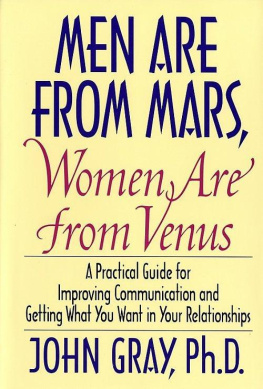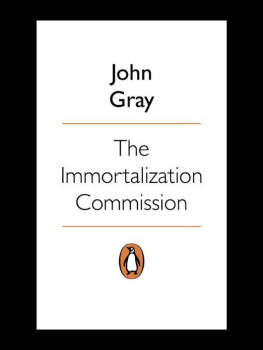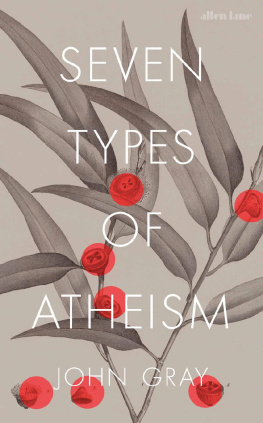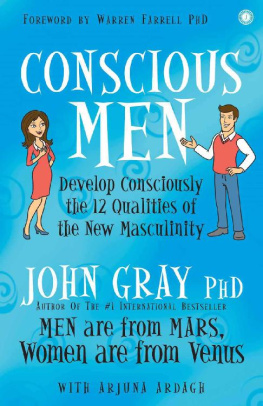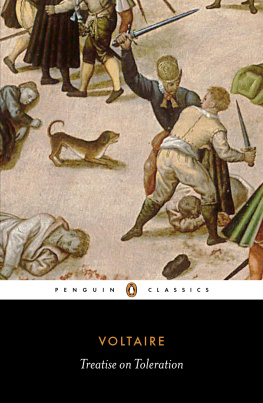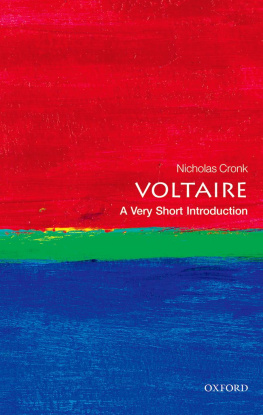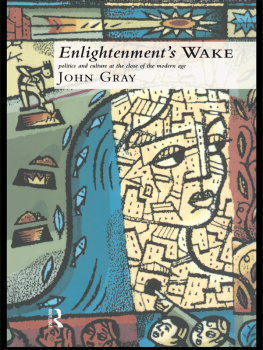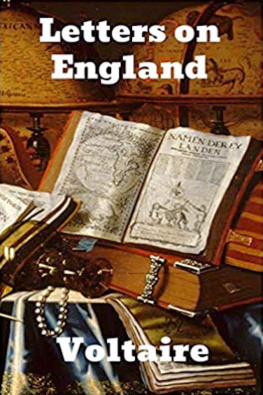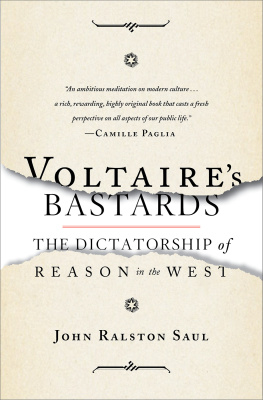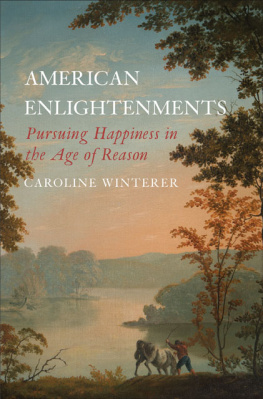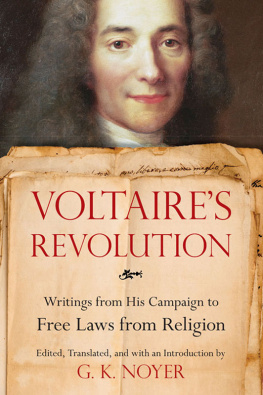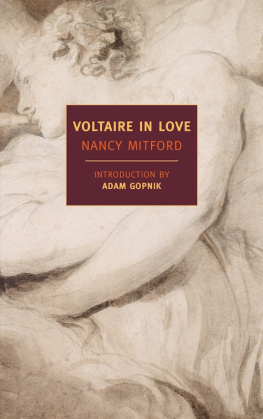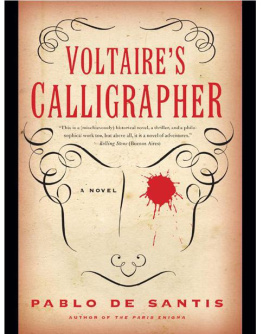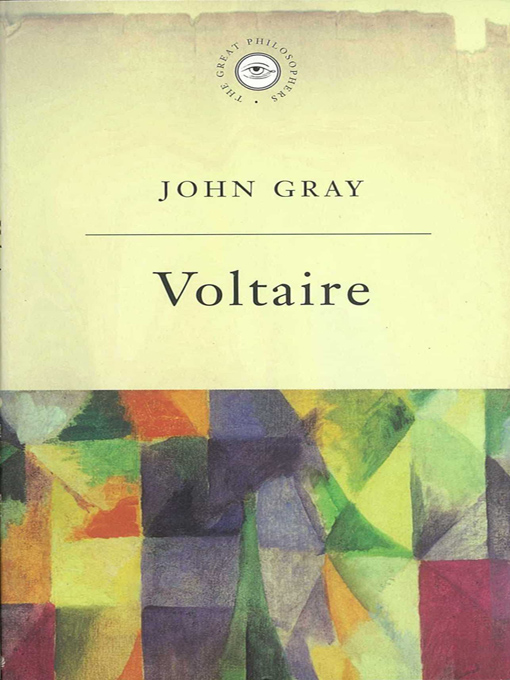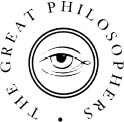For Mieko
Consulting Editor(s)
Ray Monk and Frederic Raphael
Voltaire
Voltaire and Enlightenment
John Gray
Contents
Voltaire is the central figure of the Enlightenment
Isaiah Berlin
I f, despite its history, we think of philosophy as the disinterested pursuit of truth, then Voltaire was no philosopher. He lived and died, the exemplary philosophe, a partisan. Nothing is further from Voltaires thought than the spirit of inquiry. Nor, despite his excoriating sarcasm and the unquenchable vivacity of his pessimism, was Voltaires view of humankind detached or cynical. He was a lifelong propagandist for a secular faith. The object of Voltaires philosophy was not to advance inquiry, still less to foster sceptical doubt. It was to found a new creed. Voltaire sought to supplant the Christian religion by the humanist faith of the Enlightenment. His tireless raillery was meant in deadly earnest. His opposition to Christian fanaticism had itself a fanatical bent. Voltaires lifes work was to set European life on a new foundation by constructing a successor to Christianity.
Voltaires mockery of Christian superstitions and enthusiasms Christian served a new religion of universal enlightenment. But his Enlightenment creed did not make as radical a break with Christianity as he and the other philosophes liked to believe. It inherited a good deal from the religion he meant it to supplant. The Enlightenment shared with Christianity vast hopes for the emancipation of humankind and deep intolerance towards anything that stood in the way of their universal ambitions. It is because they have so much in common that Christians and believers in Enlightenment have always been such intimate enemies. Among their common dispositions is a suspicion of any kind of intellectual inquiry whose upshot is not sanctioned by morality.
For Voltaire, philosophy was not an intellectual adventure whose end is always in doubt. like the natural sciences, which he believed it would come increasingly to resemble, philosophy was an instrument of human emancipation. Voltaire had no doubts about what that emancipation consisted in. Bleak as was his view of the history of the species, and uncertain though he judged its prospects to be, what human emancipation means is, for Voltaire and his posterity, remarkably even incredibly unproblematic. Freedom from superstition, the growth of wealth and knowledge, progress towards a universal civilization this Enlightenment project, never questioned, animated Voltaire throughout his adult life. It inspired his tireless campaigns against injustice and his unending ridicule of the authorities of his age.
Voltaire never subjected the beliefs and values that animated the Enlightenment to any extended investigation. To be sure, he was only too aware of the difficulties that stood in the way of the universal, rational civilization he and the other philosophes favoured. Indeed, he was inclined to regard civilization itself as an intermittent episode in the natural history of barbarism. But he was too preoccupied with the struggles of the day to question the ideal he served all his life. He did not ask whether much that is worthwhile might be lost in the world to which he aspired. Nor did he explore the conflicts that might arise among the values that would be central in such a world. He lacked the inclination, and indeed the time, to ask questions whose answers might not serve the cause to which he was indefatigably committed. It was, after all, the cause as he saw it of humanity.
Partly for these reasons, Voltaires writings on philosophical questions are unoriginal to the last degree. They amount to little more than a reworking of some ideas from John Locke and Pierre Bayle. Few of the entries in his Philosophical Dictionary are concerned with philosophical questions. Voltaire made no contribution to moral philosophy or to the theory of knowledge. Unlike Hume, or even Adam Smith, he did not leave an inheritance on which generations of later philosophers were to draw. If Voltaire can be said to have had a philosophy, it has today only a historical interest.
Yet, as Nietzsche intimated when he identified him as one of his few predecessors, Voltaires thought has a profound and enduring interest. More clearly than any other European thinker, he exemplifies and illuminates the limitations and contradictions of the Enlightenment that extended family of intellectual and political movements, highly disparate and sometimes falling out among themselves, which flourished in several European countries notably France, Scotland and Germany in the eighteenth century, and which shapes much of our thinking today. Unlike his derivative and dated philosophy, Voltaires contribution to our understanding of the Enlightenment and thereby to European thought remains indispensable today.
The Enlightenment cannot be understood except in the context of the creed that it aimed to supplant. Though this was most marked in Catholic countries, the philosophes were everywhere enemies of Christianity. But their ideals and beliefs were marked indelibly by the religion they sought to extirpate. They were in love with the world before the advent of Christianity (as they imagined it to have been); but even the most complete pagans among them, such as Voltaire himself, were able to enter into a post-Christian view of things only very incompletely. They were themselves too moved by the stupendous moral hopes that Christianity had kindled ever to leave it altogether behind. In consequence, they were never able to emancipate themselves fully from the faith they spent their lives condemning.
At times Voltaires hatred of Christianity led him into bigotry. His anti-Semitism originated partly in his hatred of Christianity. Like his great admirer, Nietzsche, he could not forgive the people that had given birth to Christianity. At the same time Voltaires repellent anti-Semitic prejudices were merely those of all of European Christendom. They show how incomplete was his emancipation from that now vanished world. Like Nietzsches, Voltaires recurrent fascination with the sublime misanthropist Pascal was evidence of a repressed affinity as much as of an avowed enmity.
To admire Voltaire, wrote Joseph de Maistre, ultra-reactionary, Catholic, doyen of the Counter-Enlightenment and one of Voltaires most formidable opponents, is the sign of a corrupt heart, and if anyone is drawn to his works, then be sure that God does not love him. In his Soires de St Petersburg, the great reactionary thinker describes Voltaire as the most dangerous of all the philosophes, since he employed the greatest talent with most coolness to do most mischief. De Maistres view of Voltaire as a scoffing subverter of religion was echoed by William Blake, when he wrote in his Notebook
Mock on Mock on Voltaire Rousseau
Mock on Mock on tis all in vain
You throw the sand against the wind
And the wind throws it back again
Yet, though he declared that Every honourable man must view the Christian sect with horror, and anathematized the Christian religion with the celebrated formula


